Pandora Papers, Migration and Learning - Open Gov #05
We look at how open government can help prevent corruption against the backdrop of the Pandora Papers and other news of interest.
Available in:
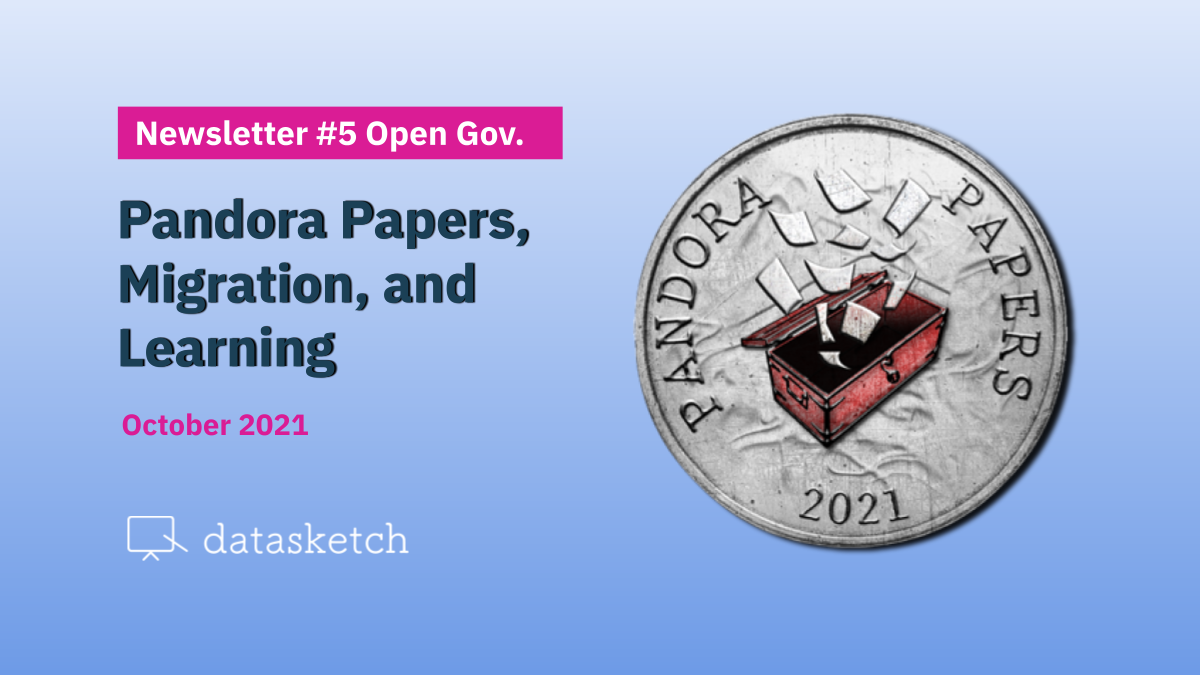
Have you reached us through social networks, or have you been forwarded this newsletter and want to receive it in your email twice a month? Subscribe!
We are Laura Tamia Ortiz, Gabriel Jiménez, María Juliana Rodríguez and Juan Pablo Marín Día, a part of the Datasketch Open Government team. If you want to read previous issues, you can do it here: Open Government Newsletter.
#Pandora_Papers

The Pandora Papers have become public. It is an investigation driven by the International Consortium of Investigative Journalists from the largest leak of tax haven files in history, with 11.9 million documents and 2.94 Terabytes.
The Consortium made available to a vast network of media and researchers, such as infobae (ar), Le Monde (fr), or the Guardian (UK) a Pandora’s Box with documents related to offshore operations and financial secrets on a global scale. More than 330 public officials in more than 90 countries have been involved.
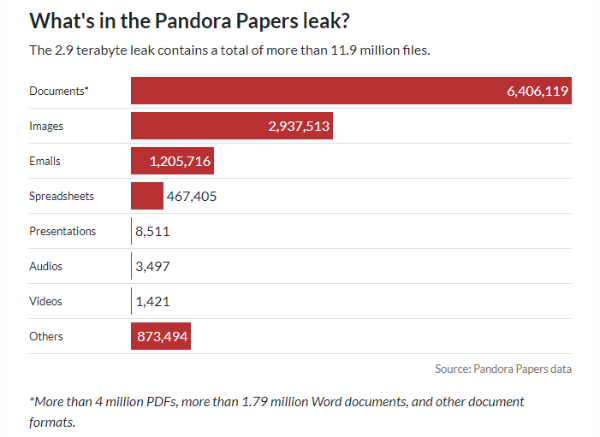
Source: Pandora Papers data ICIJ.org
Tax crimes, tax avoidance strategies, or acquisition of assets and illicit money flows, bribery, money laundering, tax evasion, human trafficking, and other human rights violations have been identified (See the entire investigation in Pandora Papers - ICIJ).
These types of investigations highlight the lack of effectiveness of laws and treaties on transparency, access to information, accountability and anti-corruption, on a worrying international scale.

Source: Power Players - Pandora Papers data ICIJ.org (At The Power Players, you can learn about the relationships of high-level politicians with offshore companies).
That should open the discussion on privacy vs. information of public interest, since confidentiality cannot be an excuse for corruption and on the need to generate policies that allow the prevention of crimes, such as those that enable the opening of information on beneficial owners, and that protect whistleblowers against power figures. Read our open parliament post to learn about the measures that can be promoted in this regard.
#Migration_in_Europe
We move from corruption to migration, another problem on a global scale, although we will focus on Europe.
One of the big problems in the Mediterranean countries of the European Union, especially in the south and east, is the aging of their population. That is coupled with a large volume of emigration of young people to other countries in search of a better future.
Despite this, some governments prefer to let migrants from other regions die rather than entering their borders, even if they are refugees or asylum seekers.
Charles Kenny, director of technology and development at the Center for Global Development, invites us to reflect on the need for more welcoming and active engagement with potential countries of origin.
It is particularly relevant with political, social, and economic crises, such as the recent takeover of Afghanistan, forcing thousands of people to flee their homes. These crises are highly publicized by the media but are gradually fading as time goes by.
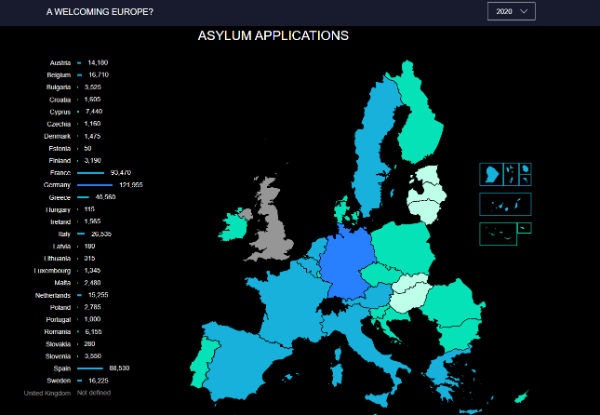
What can Open Government do? First, promote policies of transparency, participation, and inclusion.
It is essential to give a voice to migrants and their problems, regardless of their place of origin and destination. Promoting integration measures and spaces for knowledge exchange is necessary, especially when hate speeches are spreading in political arenas.
If you want more interactive information on migration and asylum seekers in the European Union, we invite you to visit: Asylum applications in the EU.
#OGP
Ten lessons from a decade
There are significant global issues whose solution does not seem straightforward. But one thing is relevant: 10 years after creating the Open Government Partnership (OGP), it has been shown that substantial reforms can be promoted when they are preceded by a union between government and civil society.
This article by Joe Powell, Deputy Executive Director of the Open Government Partnership, is an invitation to learn the essential lessons that a decade of OGP has left, such as the power of coalitions or how the differences between domestic and international politics have blurred in a globalized world.
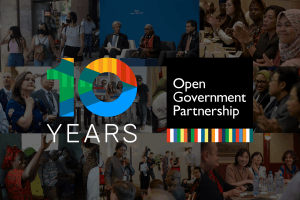
Source: 10 Lessons from 10 Years of OGP
#Learning
Open Government is a model that combines innovation, open data programs, anti-corruption, and digitization to drive reform measures in states.
Knowing what it is, where it comes from, and how to promote it can help solve public problems. We invite you to read Open Government for Dummies, where you will find a detailed summary of this concept and its implications. We also present two virtual initiatives where you can learn more about this area.
Ciudades Abiertas
Ciudades Abiertas (Open Cities), led by several Spanish city councils and Red.es, seeks to implement Open Government policies in the country. Therefore, workshops will be held to allow other organizations and institutions to learn about, replicate and implement the solutions developed. These workshops will be virtual, with a duration of two hours each, between October 7 and 27.
The topics will be open cities, standardization in access to open data, vocabularies, development of visualizations, transparency from open data, and methodologies for participatory processes. Find out the agenda at Ciudades Abiertas (es).

Local Governments, Electronic Government and Open Government
This course, offered by the Instituto Universitario de Investigación Ortega y Gasset, from Mexico, seeks to conceive the dynamics inherent to local policies that contribute to strengthening the quality of the administration, the provision of its services, and the quality of life of citizens.
The modules will focus on local management in governments, the application of e-government in local spaces, and the local dimension of Open Government. Register (es).
#Awards
We’ve talked about reforms and learning, but not about who’s behind them. That’s why we want to highlight an award that recognizes the most innovative public servants in Spain and the one in the USA that acknowledges the efforts of government agencies seeking to improve the citizen experience.
CNIS Awards
The CNIS Awards will recognize public servants who have adhered to the Commitments of Public Innovad@r (CIP) and the most outstanding projects carried out within public administrations, including an Open Government category.
Nominations are open until October 10. Those selected will be announced on October 15, and the award ceremony will take place at the special CNIS 2021 Congress Awards Gala.

GovX Awards
On September 15, the Government Experience Awards (USA) winners were announced at the Government Experience Summit, hosted by The Center for Digital Government (CDG). The awards acknowledge the outstanding efforts and best practices of government agencies seeking to improve the citizen experience and raise the bar on how services are delivered. Discover the winners at Government Experience Awards 2021: New Ways to Reach Out
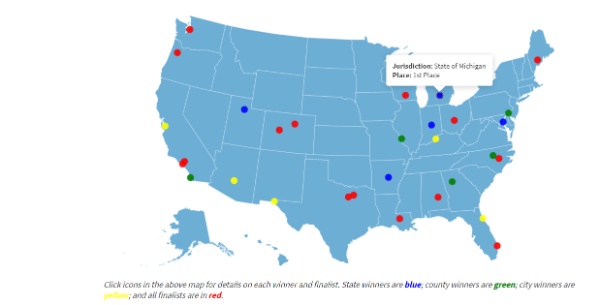
That's all for now!
If you liked this content, we invite you to share it.
If you have reached us through social networks or have been forwarded this newsletter and want to receive it in your email twice a month, please subscribe!
We have other newsletters that may interest you in Data Journalism and Data Culture.




